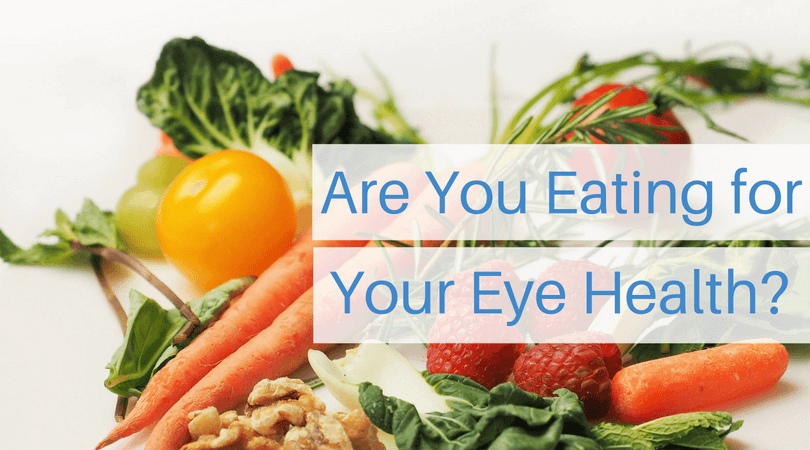Nutrition plays an important role in a variety of health factors, including vision and the development of eye health. As we age, visual acuity, or the sharpness of vision, can change due to a variety of eye-related conditions. Eating a healthy diet full of vitamins to benefit the eyes can assist in healthy aging and a lower risk for developing macular degeneration (ARMD), dry eye syndrome (DES), and cataracts.
How Nutrition Affects Your Eyes
Hippocrates was the first to say, “Let food by thy medicine and medicine be thy food,” or as we more commonly quote, “food is medicine.” Feeding your body nutrient-dense foods is a key component of preventing a variety of health issues. Proper nutrition can decrease inflammation, alkalize and detoxify the body (balance pH levels), regulate blood sugar, balance hormones, assist in nutrient absorption and digestion, and more.
Omega-3 fatty acids are an essential nutrient for healthy eyes. “Docosahexaenoic acid (DHA), a type of omega-3, is crucial to the development and functioning of the brain, nervous system, and retina,” says Claus M. Fichte, M.D., founding partner, medical director, eye physician, and surgeon at Fichte Endl & Elmer Eyecare.
“Cell membranes formed from healthy fats, such as omega-3 and omega-6 fatty acids, are thought to be better able to resist oxidative stress to retinal pigments and photoreceptors over a lifetime,” he adds. “Similarly, dry eye is known to be an inflammatory disease of the ocular mucous membranes, and omega-3 EFA supplements have, in numerous studies, been shown to be as effective as medical therapies.”
Macular health is also directly affected by nutrition. The macula is found in the central point of the retina and affects visual acuity. The dietary carotenoids lutein and zeaxanthin protect the macula by filtering out the “phototoxic” blue light found in the sun’s rays. Although a certain amount of blue light is important in the body’s ability to produce melatonin, certain levels need to be filtered out to protect the macula.
“The concentration of lutein and zeaxanthin in the macula depends, in part, on dietary consumption,” Dr. Fichte says. “Studies have shown an inverse correlation between dietary consumption of these carotenoids and age-related macular degeneration (ARMD). The retina also has specific blue-light receptors that stimulate the brain to make melatonin, and patients with healthier melatonin levels also have less ARMD.”
Poor nutrition can impact the likelihood of developing cataracts as you age. “It has been shown that patients with high blood sugar levels have a significantly higher incidence of requiring cataract surgery,” Dr. Fichte adds.
Food for Healthy Eyes
Eating a nutritional diet to promote eye health is easier than many believe. Dr. Fichte recommends making the following dietary adjustments to promote wellness.
- Consume three to five servings of organic vegetables per day.
- Vegetables are good sources of fiber, antioxidants, and phytonutrients, which are key components of metabolic health.
- Eat two to four servings of fresh fruit per day.
- Fruits are rich in fiber and vitamin C—important nutrients for collagen formation, wound repair, and gastrointestinal health.
- Decrease intake of refined sugars.
- Refined sugar contributes to inflammation and high blood sugar levels.
- Reduce consumption of trans fats in favor of moderate amounts of healthy fats
- Healthy fats such as omega-3 essential fatty acids (EFA), olive oils, nut oils, and organic butter can be beneficial for brain and circulation health when consumed in small amounts.
- Cold water fish such as salmon, tuna, sardines, and mackerel are good sources of omega-3 fatty acids.
- Take 21 to 30 grams of fiber per day.
- Fiber helps regulate how the body breaks down and absorbs sugars while keeping you hungry for longer periods of time.
- Consume foods rich with lutein and zeaxanthin.
- Eggs are a good source of protein, lutein, and vitamin A.
- Both lutein and zeaxanthin are found in spinach, kale, collard greens, broccoli, peas, and avocados.
- Carrots, tomatoes, bell peppers, strawberries, pumpkin, corn, and cantaloupe are rich with vitamin A, vitamin C, and carotenoids.
- Supplement vitamins and minerals when necessary
- Zinc, potassium, magnesium, and calcium are crucial nutrients for healthy metabolic processes. Vitamin D is also an important nutrient as it promotes immune system function and bone growth. If your diet does not include adequate amounts of these vitamins and minerals, supplements can help achieve proper levels.
Many foods are rich in nutrients to promote eye health. We’ve broken down the major components below.
For more information about nutrition for eye health, contact our office at (800) 309-2020 to schedule an appointment. We are accepting new patients and participate with most major insurances.




